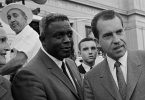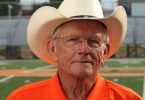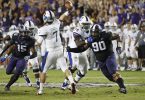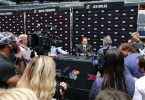True to House form, the Congressional Baseball Game in 1926 ended in dispute in the middle of the seventh inning.
Up 12-0, the Democrats protested against unannounced changes in the Republican batting order, demanding an engrossed copy of the lineup and insisting that the House parliamentarian replace the official National League umpire, who was drafted for the afternoon.
Ah, the good ol’ days.
Speculation is that if the Democrats win this year, like Megan Rapinoe, “they ain’t goin’ to the f—— White House.”
America the beautiful. Across the exploited plain. From warming sea to rising sea.
The annual tradition of the Congressional Baseball Game in reality represents a very welcome respite from the hand-to-hand combat of Washington, D.C.
First pitch for this year’s game, held mostly every year since 1909, is 7:05 p.m. at Nationals Park.
This game is unofficially the “Battle of Fort Worth.”
The Republican manager is one of ours and so is one of Dems.
Rep. Roger Williams and Rep. Marc Veasey are both homegrown Fort Worth guys who also graduated from Arlington Heights.
“Roger and I have a side battle on Arlington Heights and Fort Worth bragging rights,” Veasey said. “So, I’ll play extra hard for my brief time in game so I can carry that flag again.”
Williams, scion of the Jack Williams Chevrolet empire, is the manager of the Republicans.
Do you remember baseball, hot dogs, apple pie and Chevrolet?
Young Williams’ dream was not to one day be Rep. Williams of the state of Texas, representing a district that extends from Austin to Fort Worth, but Roger Williams, major-league baseball player.
At the time, he had much more in common with Ted Williams than Tiger Teague.
After graduating from Arlington Heights, Williams went to star at TCU as an All-Southwest Conference outfielder under baseball coach Frank Windegger. He played with future major-leaguer Jeff Newman.
In 1971, he was drafted by the Atlanta Braves.
He soon returned home to coach at TCU.
At practices leading up to Wednesday’s game, Williams could be seen outfitted in TCU ballcap.
He is taking his obligations as baseball coach as seriously as appropriations. The Republicans are looking to shake off losses in nine of the last 10 games.
Williams succeeded Rep. Joe Barton, heir to Phil Gramm and Tiger Teague in U.S. District 6, as manager.
“These guys know what’s expected of them every day. We get them out of here at 7 o’clock so they can go to their committee hearings, but they know when they’re out here that they’re [playing] baseball,” Williams told the Texas Tribune. “No different than Boston and the Yankees playing, you know?”
Right, Congressman.
This game does have a great history. With 2017 as one exception after a gunman opened fire at practice, critically wounding a Republican congressman, the game has been played in the spirit of a light-hearted get-together of political rivals.
The first game, in 1909, was put together by Rep. John Tener, the gentleman from Pennsylvania and former major-league pitcher. “Deep, dark” rumors, the Boston Globe reported, circulated that political dirty tricks might be in play in the form of “ringers.”
However, when the lineups were announced, the Globe said, the nine Republicans “were stalwart, Grand Old Party men, while the Democrats were of pure Jeffersonian strain.”
Democrats protested the selection of Republican Speaker of the House Joe Cannon as home plate umpire, settling on a compromise of James Reynolds.
That’s Fr. James Reynolds, whose reputation as an honest broker of balls and strikes was written in Scripture.
Then, the game was exclusively for House members. Since 1950, U.S. Senators have participated, as well.
Gerald Ford’s dream was to be the speaker of the house, though he had an unexpected higher calling. In 1957, then merely a representative from Michigan, he hit a grand slam in the game. The former linebacker’s blast was the first grand slam, as far as anybody could recall.
Whether that ball left the building is unclear.
Rep. Ron Paul, rabble-rouser from South Texas, is believed by some to have hit the first home run to clear the fence in 1979, successfully waiting on a slow curve from Rep. Ron Mottl.
The blast earned him a place in Roll Call’s Congressional Baseball Game Hall of Fame, a place for august men. David Bonior and Bill Richardson are Hall of Famers. So is Steve Largent, the congressman from Oklahoma who was a good NFL receiver before that.
Largent was a three-time MVP, going 5-1 as a GOP pitcher with a 2.44 ERA.
Olympian Bob Mathias isn’t a member of Roll Call’s baseball shrine, but he had a double in the 1970 game.
Rep. George Bush, noted baseball player as a Yalie, batted cleanup and had a two-run single in the 1969 game, a 7-2 GOP victory. Former major-leaguer Wilmer Mizell, then a congressman from North Carolina, struck out every hitter he faced in two innings.
Sam Rayburn isn’t in the hall, either. In fact, he probably wouldn’t be welcome, despite his lofty place in history.
The former speaker ended the game in 1958. In his judgment, the game was becoming too physically risky for members.
Case in point, Republican Thomas Curtis of Missouri had to be wheeled off the field after Rep. Eugene McCarthy bowled him over at home plate in a game in the late-1950s.
Curtis had a separated shoulder. McCarthy did far worse to Lyndon Johnson in 1968.
Politics is a far riskier business to one’s health.
It should be no surprise that politicians, the most loquacious of us all can get quite chatty as sports trash-talkers.
Pitcher Morris Udall, D-Ariz., in 1967 promised to give the Republicans the business.
He had what he called a George Romney fadeaway.
“This is a pitch that starts out in high trajectory, then appears to change position several times on the way to the plate and then dives firmly into the turf.”
A bitterly hostile critic of the escalation in Vietnam, he also had a “Johnson credibility gap ball, which always appears to be something than it really is.”
His Dean Rusk sinker was a pitch that steamed toward the plate with remarkable slowness then lunged into the dirt to avoid sailing further into uncharted domains.
His Nixon slider was “a sneaky pitch that always comes in inside and low.”
Play ball.







